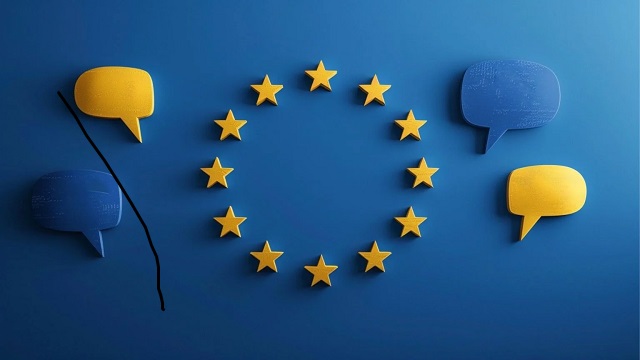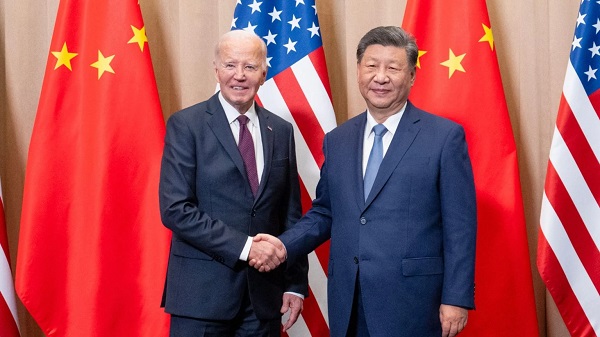Censorship Industrial Complex
Newly Released Documents Reveal Big Tech Limited Millions of Posts During EU Elections

From Reclaim The Net
|
Ah, elections—the pinnacle of democracy where the common folk cast their ballots and, ideally, choose their fate. But hold onto your hats, because behind the grandeur of the European Parliament elections this year lurked a very different sort of governance, one executed not in the open streets but in algorithmic backrooms. Welcome to the Age of Censorship-as-a-Service, brought to you by our ever-dependable friends at Meta, Google, and TikTok.
Meta’s Mission: Make the Truth More… Manageable
Let’s begin with Meta. In a move that feels like something out of a dystopian satire, Meta proudly announced they had reduced the reach of tens of millions of posts across Europe. They wielded over 150,000 Facebook fact-checking articles to de-escalate the virality of 30 million pieces of content.
According to Meta, this wasn’t censorship—no, it was a mere “scaling of the work of independent fact-checkers.” The way they tell it, this was all in the name of maintaining “informed and reliable discussions.” Ah, reliable discussions, where only pre-approved, EU-certified opinions are allowed to flow freely.
Of course, official government statements and the edicts from the holy temples of global health organizations were entirely exempt from Meta’s moderating fervor. After all, why impede the credibility of those who are never wrong—except, of course, when they are, but let’s not get hung up on inconvenient details like that.
On Instagram, another Meta product, this brave new moderation mission persisted. The platform used 39,000 fact-checking articles to put the brakes on nearly a million posts. That’s right—one million “potentially hazardous” thoughts and opinions that, for the good of humanity, needed a little algorithmic throttle. And if you were wondering, it wasn’t just the memes of conspiracy theorists—they made sure that you, your grandma, and that neighbor with too many political opinions got the message too: “Play nice, or we’ll see to it no one hears you.”
TikTok: Suppressing, But Make It Fashionable
Meta wasn’t the only digital nanny keeping Europeans in line. Over at TikTok, the playbook got even hazier. The platform took pride in admitting that it restricted misleading posts—though, unlike Meta, TikTok kept the numbers conveniently vague. You see, their strategy was more about “awareness,” guiding content creators with a gentle algorithmic shove away from the tempting edges of disinformation. How thoughtful.
As if to prove their dedication to curated reality, TikTok also pointed Irish users in the direction of fact-checks from TheJournal.ie, an outlet that coincidentally receives EU funding. No conflict of interest there, right? Just an honest effort to “raise awareness.” And while TikTok didn’t offer up the numbers, we can be assured that plenty of thumbs danced across phone screens only to find their intended messages conveniently dulled down or disappeared.
Google: Where Terms of Service Are Optional
And then we have Google, that beacon of a supposedly neutral search engine—except when it isn’t. Reports show that YouTube, under Google’s magnanimous ownership, automatically deboosted videos that complied with their very own terms of service. Yes, you read that right. Even when content passed muster by their own rulebook, some unseen hand deemed it “unworthy.” Google tells us this was to curb the spread of misinformation. A noble aim, except for that pesky issue of who gets to decide what counts as misinformation—and why.
Critics, like Tom Vandendriessche, an MEP for Patriots for Europe, have not been fooled by the big, earnest proclamations of “integrity protection.”
Vandendriessche—whose party has fought and won against Big Tech’s silencing efforts—paints a stark picture of unchecked power: tech companies with unprecedented influence, deciding who gets heard and who doesn’t.
“This could lead to an era of ‘techno-communism,'” Vandendriessche argued to Brussels Signal, where an unelected cabal decides what constitutes reality for the rest of us. A “techno-communism” where, if your thoughts don’t align with the given narrative, they might as well not exist.
It’s not like Vandendriessche is shouting into the void, either. His criticism comes backed by experience, his party having already tasted the bitter fruits of deplatforming. If a democratically elected official can’t even get his voice out there without tech giants intervening, what hope is there for the average citizen with an inconvenient truth?
The EU’s Seal of Approval: Trust Us, We’re Here to Help
But let’s not forget the EU brass, who are, predictably, patting Big Tech on the back. Věra Jourová seems to believe they’ve stumbled onto some grand new way to “protect the integrity of elections.” Their stance on Big Tech’s secretive influence campaign was remarkably sunny—because nothing says “protecting democracy” like a few ultra-rich corporations quietly deciding what can or cannot be said during election season.
What’s fascinating is the conviction with which the EU spins this story. They genuinely believe—or want us to believe—that this centralized control is for our benefit, a way to combat the terrifying specter of “disinformation.” Clearly, the best way to fight misinformation is to silence millions of voices, all while exempting the officials and organizations whose statements are apparently beyond reproach. Trust us, they say: We’re only limiting the information you receive for your own good.
|
|
|
|
Since you’re here, it’s clear you value Reclaim The Net. Today, we’re inviting you to become a paid supporter. Although we rely on contributions, only a fraction of our readers—less than 0.2%—choose to contribute.
By becoming a supporter today, you can ensure Reclaim The Net thrives for years to come. There’s no requirement for ongoing support; you can control or cancel your yearly support from inside your own account without needing to get in touch.
Please take a moment to become a supporter of Reclaim The Net and get all of the extra benefits as a thanks.
|
Censorship Industrial Complex
G20’s Online Speech Clampdown Calls Set To Ignite Free Speech Fears

G20 leaders convened in Rio de Janeiro have called for enhanced responsibility and transparency from digital platforms to tackle the growing challenges of “misinformation,” “disinformation,” “hate speech,” and others on their long list of supposed online “harms.”
The summit’s final declaration highlighted the transformative role of digital platforms in global communication but noted the adverse effects of digital content’s rapid spread. It called for increased accountability from platforms to manage speech, which should raise eyebrows among free speech advocates who’ve heard all this before.
We obtained a copy of the declaration for you here.
During the summit, the leaders highlighted the transformative impact of digital platforms in communication and information dissemination across the globe. However, they also alleged negative ramifications of unchecked digital spaces, where “harmful” content can proliferate at an unprecedented pace and scale.
In response, the G20’s final declaration underscored the critical role of digital platforms in ensuring their ecosystems do not become breeding grounds for speech they don’t like.
The declaration states: “We recognize that digital platforms have reshaped the digital ecosystem and online interactions by amplifying information dissemination and facilitating communication within and across geographical boundaries. However, the digitization of the information realm and the accelerated evolution of new technologies, such as artificial intelligence (AI), has dramatically impacted the speed, scale, and reach of misinformation and disinformation, hate speech, and other forms of online harms.”
The G20 goes on to say that it emphasizes the “need for digital platforms’ transparency and responsibility in line with relevant policies and applicable legal frameworks and will work with platforms and relevant stakeholders in this regard.”
The declaration even says more measures need to be taken to control what it says is the spread of online misogyny and the need to combat it “online and offline.”
Censorship Industrial Complex
Tucker Carlson: Longtime source says porn sites controlled by intelligence agencies for blackmail

From LifeSiteNews
Journalist Glenn Greenwald replied with a story about how U.S. Speaker of the House of Representatives Mike Johnson changed his tune on a dime about the Foreign Intelligence Surveillance Act (FISA), which allows the government to spy on American communications without a warrant. The journalist made the caveat that he is not assuming blackmail was responsible for Johnson’s behavior.
Tucker Carlson shared during an interview released Wednesday that a “longtime intel official” told him that intelligence agencies control the “big pornography sites” for blackmail purposes.
Carlson added that he thinks dating websites are controlled as well, presumably referring at least to casual “hook-up” sites like Tinder, where conversations are often explicitly sexual.
“Once you realize that, once you realize that the most embarrassing details of your personal life are known by people who want to control you, then you’re controlled,” Carlson said.
He went on to suggest that this type of blackmail may explain some of the strange, inconsistent behavior of well-known figures, “particularly” members of Congress.
“We all imagine that it’s just donors” influencing their behavior, Carlson said. “I think it’s more than donors. I’ve seen politicians turn down donors before.”
Journalist Glenn Greenwald replied with a story about how U.S. Speaker of the House of Representatives Mike Johnson changed his tune on a dime about the Foreign Intelligence Surveillance Act (FISA), which allows the government to spy on American communications without a warrant. The journalist made the caveat that he is not assuming blackmail was responsible for Johnson’s behavior.
Greenwald told how he had seen Johnson grill FBI Director Christopher Wray about his agency’s spying and “could just tell that he felt passionately about (this),” prompting Greenwald to invite Johnson on his show, before anyone had any idea he might become Speaker of the House.
“One of the things we spent the most time on was (the need for) FISA reform,” Greenwald told Carlson, noting that the expiration of the current iteration of the FISA law was soon approaching. He added that Johnson was “determined” to help reform FISA and that it was in fact “his big issue,” the very reason he was on Greenwald’s show to begin with.
Johnson said regarding FISA, “We cannot allow this to be renewed; it’s a great threat to American democracy; at the very least, we need massive, fundamental reform” according to Greenwald.
Johnson became House Speaker about two months to three months later, and Greenwald was excited about the FISA reform he thought Johnson would surely help bring about.
“Not only did Mike Johnson say, ‘I’m going to allow the FISA renewal to come to the floor with no reforms.’ He himself said, ‘It is urgent that we renew FISA without reforms. This is a crucial tool for our intelligence agencies,’” Greenwald reounted.
He noted that Johnson was already getting access to classified information while in Congress, wondering at Johnson’s explanation for his behavior at the time, which was that he was made aware of highly classified information that illuminated the importance of renewing FISA and the spying capabilities it grants, as is.
Greenwald doesn’t believe one meeting is enough to change the mind of someone who is as invested in a position as Johnson was on FISA reform.
“I can see someone really dumb being affected by that … he’s a very smart guy. I don’t believe he changed his mind. So the question is, why did he?” Greenwald asked.
“I don’t know. I really don’t. But I know that the person that was on my show two months ago no longer exists.”
Theoretically, there are many ways an intelligence agency could coerce a politician or other person of influence into certain behaviors, including personal threats, threats to family, and committing outright acts of aggression against a person.
A former CIA agent has testified during an interview with Candace Owens that his former employer used the latter tactic against him and his family, indirectly through chemicals that made them sick, when he blew the whistle on certain unethical actions the CIA had committed.
“This is why you never hear about CIA whistleblowers. They have a perfected system of career destruction if you talk about anything you see that is criminal or illegal,” former CIA officer Kevin Shipp said.
As a form of coercion, sexual blackmail in particular is nothing new, although porn sites make the possibility much easier. In her book “One Nation Under Blackmail: The Sordid Union Between Intelligence and Crime That Gave Rise to Jeffrey Epstein,” investigative journalist Whitney Webb discusses not only how the intelligence community uses sexual blackmail through people like Jeffrey Epstein but how it was used by organized crime before U.S. intelligence even existed.
-

 Economy10 hours ago
Economy10 hours agoCOP 29 leaders demand over a $1 trillion a year in climate reparations from ‘wealthy’ nations. They don’t deserve a nickel.
-

 Alberta8 hours ago
Alberta8 hours agoOn gender, Alberta is following the science
-

 Energy9 hours ago
Energy9 hours agoOttawa’s proposed emission cap lacks any solid scientific or economic rationale
-

 Business2 days ago
Business2 days agoTrump’s government efficiency department plans to cut $500 Billion in unauthorized expenditures, including funding for Planned Parenthood
-

 Alberta2 days ago
Alberta2 days agoAlberta fiscal update: second quarter is outstanding, challenges ahead
-

 Brownstone Institute1 day ago
Brownstone Institute1 day agoFirst Amendment Blues
-

 Crime2 days ago
Crime2 days agoMexican cartels are a direct threat to Canada’s public safety, and the future of North American trade
-

 Business1 day ago
Business1 day agoDEI gone?: GOP lawmakers prep to clean house in federal government





